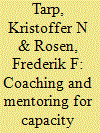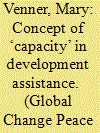| Srl | Item |
| 1 |
ID:
111538


|
|
|
|
|
| Publication |
2012.
|
| Summary/Abstract |
Coaching and mentoring for capacity' is becoming increasingly important in the state-building toolbox. If executed properly, this instrument is believed to be significantly more effective than traditional technical assistance and would consequently seem to hold great promise for the state- and peacebuilding agenda. The latest offshoot of this development is the Initiative for Capacity Enhancement in South Sudan. The initiative seeks to enhance the capacity of the South Sudanese state apparatus by deploying civil servants from neighbouring nations to coach their South Sudanese counterparts. This paper explores this particular initiative with the aim of identifying insights about designing coaching and mentoring programmes for capacity development.
|
|
|
|
|
|
|
|
|
|
|
|
|
|
|
|
| 2 |
ID:
142025


|
|
|
|
|
| Summary/Abstract |
The idea of capacity development has become ubiquitous in discussions of development assistance: a lack of capacity in developing countries is frequently identified as the main obstacle to development and building ‘capacity’ is seen as the most important output of development assistance. The terms ‘capacity development’ and ‘capacity building’ are, however, relatively new in development assistance discourse, having only come into frequent use in the last two decades. This paper examines the history and different uses of the concept of capacity in development assistance literature, tracing its origins and rise in popularity. Although a large amount of material has been produced on the topic there is no clear agreement on what it means, with a range of interpretations used by different authors and in different contexts. The more expansive and ambitious approaches promoted by some development organizations have a number of theoretical and practical difficulties and it is argued that the wide and imprecise use of the term has undermined its usefulness.
|
|
|
|
|
|
|
|
|
|
|
|
|
|
|
|
| 3 |
ID:
167521


|
|
|
|
|
| Summary/Abstract |
Building capacity in ocean affairs, the law of the sea, and marine scientific research in relation to the needs of developing countries is an integral part of the U. Convention on the Law of the Sea and associated instruments, including the International Maritime Organization (IMO) treaty regime. This article traces the development of capacity-building initiatives at the World Maritime University (WMU) over the past three decades, including the establishment of the WMU–Sasakawa Global Ocean Institute in 2018. The establishment of the new institute should be viewed within the wider context of the extraordinary philanthropy of the Sasakawa Peace Foundation and the Nippon Foundation in building human resource capacity and in supporting advanced academic research on complicated and contentious ocean issues. The article describes the extensive consultation process that informs the research, education, and capacity development agenda of the new institute, including work on the ocean-related goals of the 2030 Agenda for Sustainable Development.
|
|
|
|
|
|
|
|
|
|
|
|
|
|
|
|